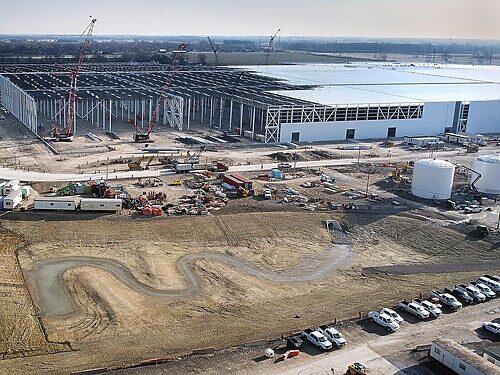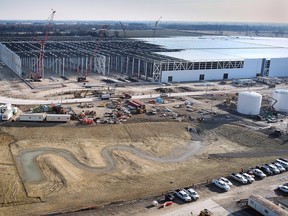
In an otherwise “extraordinary year” for the domestic automotive sector, the leader of Canada’s largest private sector union recalls the darkest day when she felt promised huge new investments — and thousands of jobs — were at dire risk. Unifor national president Lana Payne said her most difficult day in 2023 was getting the phone call last spring from Stellantis North America COO Mark Stewart informing her the NextStar battery plant was in jeopardy over a dispute with the federal government on matching the much more generous U.S.’s Inflation Reduction Act subsidies.
THIS CONTENT IS RESERVED FOR SUBSCRIBERS ONLY Subscribe now to read the latest news in your city and across Canada.
- Unlimited online access to articles from across Canada with one account.
- Get exclusive access to the Windsor Star ePaper, an electronic replica of the print edition that you can share, download and comment on.
- Enjoy insights and behind-the-scenes analysis from our award-winning journalists.
- Support local journalists and the next generation of journalists.
- Daily puzzles including the New York Times Crossword.
SUBSCRIBE TO UNLOCK MORE ARTICLES Subscribe now to read the latest news in your city and across Canada.
- Unlimited online access to articles from across Canada with one account.
- Get exclusive access to the Windsor Star ePaper, an electronic replica of the print edition that you can share, download and comment on.
- Enjoy insights and behind-the-scenes analysis from our award-winning journalists.
- Support local journalists and the next generation of journalists.
- Daily puzzles including the New York Times Crossword.
REGISTER TO UNLOCK MORE ARTICLES Create an account or sign in to continue with your reading experience.
- Access articles from across Canada with one account.
- Share your thoughts and join the conversation in the comments.
- Enjoy additional articles per month.
- Get email updates from your favourite authors.
Article content
Article content “I knew the impact that would have on Windsor Assembly and the Brampton plant,” Payne told the Star. “That battery factory was the lynchpin for supplying those plants in their EV (Electric Vehicle) transitions. It put a huge number of jobs at risk. “It was as serious as it could get. If we’d lost our momentum then, it was going to be hard to get back on an upward trajectory for the auto industry in Canada.” After seven weeks of intense negotiations involving Unifor, Stellantis, LG Energy Solution and the federal and provincial governments, a deal was reached that could provide up to $15 billion in tax credits if production and job targets are met. That successful effort secured a number of other exciting investments giving Canada a foothold in the transformation underway of the transportation sector.
We’ve turned auto jobs into plum jobs again
While the auto industry continued to take big steps in 2023 towards its electric future, it was the historic gains made by the auto unions in new contracts with the Detroit Three that topped auto sector observers’ lists of most significant developments of the year. For the first time in more than two decades, aside from the financial crisis of 2008-09 that dealt with potential bankruptcies, Unifor and the United Auto Workers bargained new contracts simultaneously and those negotiations produced record deals for both unions.
Article content “From a North American point of view, the labour negotiations were the big highlight,” said Sam Fiorani, AutoForecast Solutions vice-president of global vehicle forecasting. “It will change not only the auto industry’s pay rates, but other industries as well. Between Unifor and the UAW, it opens the door for better pay for working-class people.”
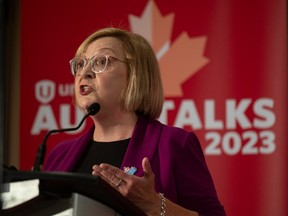
After 15 years of fighting concessions, the unions caught the wave of prosperity and record profits that have left the industry flush with cash. They achieved immediate double-digit wage increases and compounded pay gains ranging from 20 to 33 per cent. Unifor’s labour deals also confirmed the new electrified products for Windsor Assembly (Dodge Challenger and Charger), Brampton (an electrified Jeep) and ensured new investment that extends the life of the Etobicoke Casting Plant. Salary grids were cut in half, a new defined pension plan was introduced in Canada and a full cost-of-living allowance restored meaning new hires will see their hourly rates nearly double by the end of Unifor’s three-year deal. The impact within the industry among non-unionized OEMs (original equipment manufacturers), such as Toyota, Nissan, Honda, Volkswagen and Hyundai, has been immediate. All those firms announced they’d be improving their wage offerings similar to the Detroit Three settlements.
Article content “It was an extraordinary year with a lot more investment,” said Unifor’s Payne. “We got the next-generation Silverado pickup truck in Oshawa, secured the battery plant in Windsor and the labour agreements were so significant. “Getting the battery plant secured was a turning point for us in the Canadian auto sector. It’s the return of greenfield construction along with battery plants in St. Thomas and Quebec.” Helping secure those investments allowed Payne to leap from the frying pan into the fire of a complicated and uncertain set of negotiations in an industry transforming for an electrified future. Payne said the success of those labour agreements represents “a turning point for the industry in North America. “In Canada, it shows we can have strong investment and good paying jobs. One is not at the expense of the other. “We’ve turned auto jobs into plum jobs again. That was our goal.” In addition to economic gains, Payne said the contracts represent a template for other industries in how to support workers during the technological transformations of their workplaces.
Article content
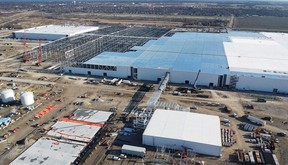
Trillium Network of Advance Manufacturing executive director Brendan Sweeney said the drama around the battery plant is a reminder of the fluid nature of an industry that needs constant attention. “The work is never done,” said Sweeney, who felt the announcement of the massive Volkswagen battery plant in St. Thomas was the key industrial addition in 2023 for the Canadian auto industry. “This industry is a big creature and we have a lot of work ahead to maintain the momentum.” The willingness by the federal and Ontario governments to match American subsidies, said Sweeney, “shows how important and the value these investments hold. These are 50-plus-year investments.” Sweeney said an interesting confirmation that emerged this year is just how important internal combustion engine products remain to the auto industry. He noted Ford Motor Company was the first of the Detroit Three to reach a contract agreement on either side of the border this past fall once Unifor threatened to shut down the company’s two engine plants in Windsor. Windsor supplies 6.8-litre and 7.3-litre engines for Ford’s F-series truck lineup — the company’s most profitable product — commercial vans and the 5.0 litre engine for the Mustang.
Article content “Those in the industry understand the need to maintain those internal combustion products to power the F-250s and 350s for more than another decade,” Sweeney said. “They make lots of money from those trucks. The likelihood of them giving up on internal combustion F-series trucks without something similar to replace it is very low.” In a broadcast appearance at Goldman Sachs’ 15th annual Industrials and Autos Week in early December, Stellantis CEO Carlos Tavares said the industry needs to be able to make a profit on a US$25,000 electric vehicle the middle class can afford. He added the industry is entering its ‘Darwinian’ era where the strongest survive and the legacy automakers are best-positioned to do that. “What we believe is that the guys who are using what we would call as a shortcut, the legacy business, to fund the future are going to be the guys who are going to be in the best position to accommodate those different scenarios, because, basically, we are doing very good money with the legacy business,” Tavares said. “Already, (there is) significant money with the EV business, but there is still a lot of uncertainty out there.”
Article content
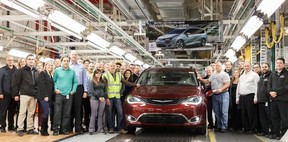
Tavares revealed Stellantis is profitable in the EV market in both North America and Europe and currently enjoys the industry’s best profit margins at 14.4 per cent through the first six months of 2023. He added the uncertainty on the pace of the EV transition going forward will be impacted by the outcome of next year’s U.S. presidential and European Union elections. Those outcomes could result in changes to fuel/emissions standards and the deadlines for the banning of the sale of new internal combustion engine vehicles. A slower transition will help companies on the financial bubble, but Tavares expects to see some automakers get out of electric vehicle production during the last half of the decade. “If it’s purely linear, with the amount of capital that you need to fund for products, which structurally are less profitable than the ICEs, they are going to put themselves in trouble quite quickly,” Tavares said. “In that case, a shorter period of time for them.” Fiorani said governments have also miscalculated with increasingly aggressive timelines for banning the sale of new internal combustion vehicles. He cites the historical precedents on fuel and emission standards in California that were similarly aggressive only for the dates to be moved backwards repeatedly.
Article content Currently, Canada and nine U.S. states plan to ban the sale of new non-commercial light vehicles with internal combustion engines in 2035. “The problematic step in picking specific dates was never going to work,” Fiorani said. “All the pushes are good for clean air and it pushed the industry forward. You can only go so fast based on how fast industry and buyers will go. “At some time, politicians will have to push back the deadlines. In reality, they’re not going to happen.”
Related Stories
-

Windsor lands another big battery supply chain investment
-

Political brouhaha erupts in Ottawa over NextStar, other battery plant deals
-

Unifor workers approve new contract with Stellantis
Jim Stanford, director of the Centre for Future Work and former Unifor economist, said another issue that bears watching closely is the rise of the Chinese auto industry and its attempt to gain access to North America by putting roots down on Mexico. “The Chinese are going to take up more and more space in the market,” Stanford said. “Geopolitics is going to come into play. “It’s likely American politicians will believe in trade, but not hands-off trade. Politicians don’t have this on their radar right now and they should.”
Twitter.com/winstarwaddell
Article content


